1919-1929
BABU ENGLISH In July 1919 the Pmr. Of Lungleh one Saturday sent me up -/4 too much change. I was passing the P.O. the next day on my way to visit the Hospital & called there to tell him of his mistake. I had a rupee with me and told him that I could return of the the four annas there & then if he could give me change. He said he could & I gave him the 1/- & received what I thought was -/12 change; but from a note which I received from him the next day I conclude he must have given me 1/- of small change & did not take the -/4 annas at all.
The following is his note: –
“Rev J H Lorrain
Serkawn,
22.7-1919
Sir,
No Sir, I do not take the four annas on Sunday when I was made a change to your’s for rupee one,
Kindly see your account.
I have &c.
[illegible signature]
Lungleh”
THRESHING SUPERSTITIONS During threshing the Lushais avoid mentioning certain things for fear of bringing ill luck, such as monkeys, the dead, ghosts, &c. They do not allow others to take brands from their fire, nor will they burn cloth. They also put the following near the place of threshing – ears of rice, a hoe, sickle, ginger, thâng, vako hrui, certain gourds. They put two pieces of phelshep (split bamboo) over these in the form of an arched cross & place a laite (small ladle made of a gourd) at the place of crossing.
Some, when threshing, will not speak a word to passing strangers for fear of bringing ill luck.
During threshing they chant the following lines: (24.4.20)
“Fâng râwng aw! Fâng râwng aw!
Chhûmpui zîng-in lo zîng rawh
Ka chhak a tlâng lianpui khi rawn el rawh,
Chhûmpui angin lo-pung thûr thûr rawh.”
SELLING BABY AS SLAVE In Lushai if parents are unfortunate and are unable to rear their children they resort to the following stratagem when they have lost several little ones in succession. The next baby born to them is made over to a neighbour. The infant is taken to the neighbour’s house & he encircles its ankles with miniature fetters, and then (or later) offers a sacrifice called “âr mit rawh” The child is thereafter known as the neighbour’s “tu”. The idea seems to be to make the evil spirits, who are supposed to have caused the death of the other children, think that the child belongs to the person to whom it has been made over & not to the parents against whom they have evidently done spite. The ceremony is known as “sala zawr” (Selling as a slave” or “selling into slavery.”) 24.4.20
SHOOTING GIBBON APE It is said that if a gibbon is shot it invariably wipes the wound with a leaf or two & throws them away (Evangelist vouches to having seen a gibbon do this which he shot twice) The leaf thus used by the gibbon is said to bring good fortune to the person who picks it up. It is also said to ease the pain of the pangs of child birth if rubbed whenever there is pain. 8.7.20
FATE One’s fate is said to be settled at birth. The expression used for it is “Khuavang lai ah chhan.” Khuavang being supposed to settle one’s fate upon one as one is separated from one’s mother by the cutting of the umbilical cord. 9.7.20
DEPARTING SPIRIT MET The departing spirit of one who dies is said to be met by the Spirits of those of his family who have already died, who conduct it to the abode of the disembodied spirits. Thus those whose families have died before them are comforted by this thought as death approaches. 8.7.20
HAIR SUPERSTITIONS If one’s hair is cut and thrown on the ground there is danger of it being carried off by a toad to his its hollow & sat upon by it. This is sure to make the owner of the hair ill.
The Lushais will not wash their hair at the head waters (spring) of a stream, lest a hair float down the current & be swallowed by a fish. This would produce illness of the owner of the hair.
SPIRIT-SOUL One’s own Spirit sells one to the Devil
The Lushais believe that each man has at least two spirits. One (Thlarau) never leaves him. The other is a kind of second self or umbra (thla) which sometimes deserts one & causes illness. If sometimes sells one to the demons & then they have to be sacrificed to in order to secure recovery or ransom.
SPIRITS of the DEAD See p. 95
The Lushais believe that the spirits of the departed come to fetch away the spirit of soul of a man when he dies (1.9.20)
EARTHQUAKES The Lushais say that an earthquake takes place every time a dung beetle (pawng ek lîr) reaches the edge of the earth (kâwl a vel chhuah-in ) with its ball of dung which it has been rolling along day and night. This accounts for the infrequency of earthquakes for most of these beetles fail to reach the edge of the earth. The word lîr a nghing itself is derived from this idea. Lîr = to roll along (as ball of dung) & nghing = to shake or tremble. The ball of dung falling over the edge of the world, which has by that time accumulated to an enormous size, causes the shock to the earth. A beetle who has performed this fete three times becomes “thang chhuah ” they say. The beetle is probably the scarab of the Egyptians.
BISCUITS. (Babu English) 21.9.21
I sent the Bengali Telegraph Signaller’s & the Postmaster’s little girls some biscuits one day which I had promised them the day before when I was at the Post Office. This is the letter of thanks which their father wrote me. “Rev. J.H. Lorrain — Sir — Received with thanks the biscuits you sent yesterday for our girls all the girls get the biscuits with happy and *enjoyed much glad of its eating. Thanking you Sir for your kindness, yours faithfully Sech[illegible] Signaller (21/9)
*”enjoyed” was spelt “enjoid”
PRAYING INTO A BEER POT About the time that Dr Frazer [sic] was at Aijal ( ) a strange new sect arose in Suangphai village about a day’s journey from Tidim in Chin Hills. In oct 1921 I met a young Christian man Ngulthanga who in his unconverted days was a member of this sect & he told me all about it. (The young man was with Edwin Rowlands when he came to our autumnal meeting)
The new religion was revealed to one Pau-tin-hauva in a dream. They call God “Phaza” which is said to be a Burmese name for the Deity. All the youths of this sect are trained as priests over whom there is one who acts as High Priest. They do not sacrifice to demons as do their neighbours, but they retain the worship of Ancestors (Sakhua) to whom they sacrifice the pig, as do the Lushais. They drink beer & may eat any kind of flesh. The outstanding peculiarity of their religion consists of praying into an empty beer pot, which gives forth a a [sic] hollow booming sound. They say that God has four children of whom Jesus us one, to pray whom, it is said, they sometimes pray. Behind the girl there is a zu pot wh. the company imbibe more or less in turn. The man feeling the pulse tells the other what to pray for (who is to be [illegible]) & they proceed [illegible] with open eyes if nothing was happening.
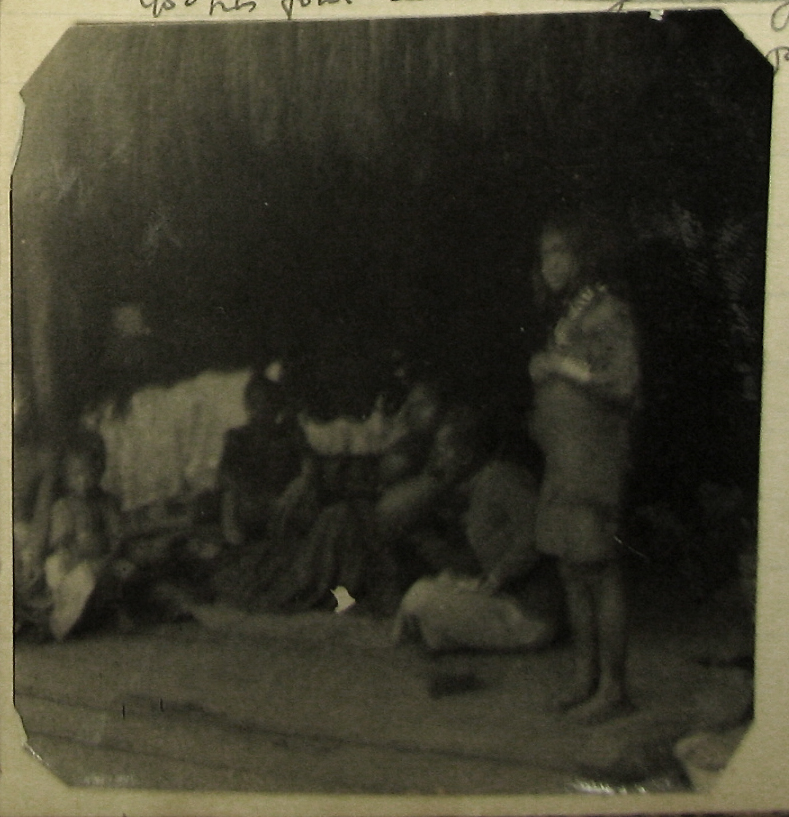
“The Bleeding Gladiator” Letter written to Rev. Herbert Anderson of Calcutta by a Bengali gentleman who wished to see him but who had been told that he was going on a visit to the Lushai Hills & the interview must therefore be postponed
“Po Bhowanipur
No 1 Bolaraw [Binau?]
Ghat Road
19.10.21
“Rev Sir,
“I received your kind favour on the 17th visit.
“Such a fine sample of pure & noble heart I have never experienced in my life. Your modesty & benevolence is unparallel (sic)
“May God bless you with a long life that many may get solace through your magic touch.
“I learn that you are starting for Lushai & that is nothing but a play of my fate.
“Let God’s will be done
“Now may I know that there is there a possiblity (sic) of your returning sooner than the 16th Nov. If so when.
“I am a bleeding gladiator fighting with the cruel fate in the arena.
“I will meet you at first call. [Now?] my motive is to see a “Man”, and you are my Hero
“My best regard to you. Soliciting the favour of an early reply.
I remain, Rev Sir,
Yours faithfully
(Signed) K.P. Chowdhary”
Late Weaning of Children Lianchhunga the Vanhne Schoolmaster (1925) when he was a schoolboy at Serkawn & was going in for his Lower Primary Exam (aged 12) was still being suckled by his mother (arûkin) He was an only child. What age was [done?] when he was weaned (?)
Making a Good Finish Mr Wilson writing to India about the return of one of the staff says: “Mr __ has arrived & I have had a rather long talk with him. He has gone down to ___. It is rather a sad homecoming for him, & I felt rather heavy-hearted when he left me. It is a boon we may all well pray for that, as the years pass, we may be able to make a good finish.
DIED of OVEREATING (1925) The Lushais when they have had sufficient food say “Ka puar tawh” (I am satisfied), but the Chins consider it very bad form to say use these words. A story is told of a certain Chin who migrated into Lushai [illegible] about 5 years ago. He was at Rotlang village on a visit & his Lushai host at the meal would ask him every now & then if he had had enough (I puar tawh em?) but as it would have been rude for his Chin view to say he had had sufficient he kept saying ‘No’ & they consequently continued to urge him to eat more & more until he had over eaten himself & presently died from the effects.
? has “puar” a difft meaning in Poi [Lai] from its meaning in Lushai?
“Better Translation than the English Bible” Rev D.E. Jones of Aijal is said, by C. Z. Huala, Teacher of Biate, to have made the statement that in my translation of the Lushai New Testament the Lushais have a better rendering than the English Bible. His (C.Z.H’s) words are as follows: “Mizo Thuthlung Thar Bu I lehlinnaah lian lawm thu sauir [?] a tûl a ni – nangmah leh Pathian hrêvah: Kan Thuthlung Tharah hian, thu sawi [illegible] ngai pawh a awm mang lo, tih theih a ni; hmun chanchin leh dân then khat mai lo chu. Sâphluia’in “English Bible aia ṭha zâwk in nei a ni”, a ti a. Chu chu ka awi êm êm mai. I bei nasatzia, i tih ngunzia hi, mizo fate z.z. tân a va lawm awm em!”
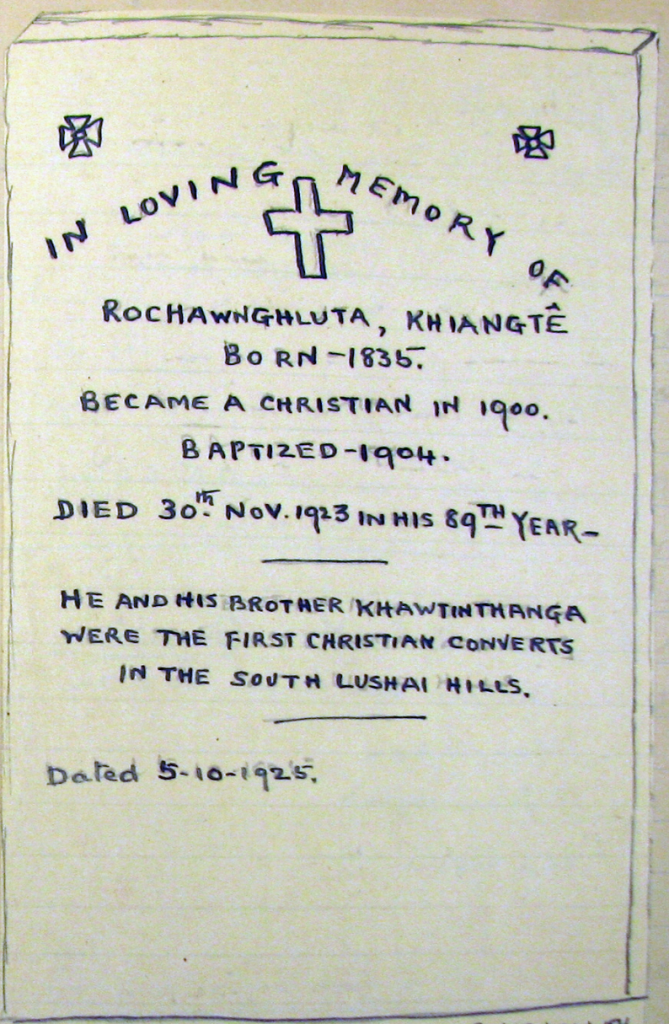
Baptized. 30.1.04 [note: date somewhat illegible]
Memorial Stone
Erected on Sethlun Kâwn
to my old friend
Rochawnghluta
“Whether the Weather” Repeated at the Opening of the “Children’s Church” (in connection with Mr. [illegible] Rountree Clifford’s West Ham Mission) in Barking Road, after Mr . Carey Bonner — on Thursday after June 24. 1926.
“Whether the weather is cold,
Or whether the weather is hot;
Whether the weather is fine,
Or whether the weather is not;
We’ll weather the weather whatever
the weather,
Whether we like it or not.”
Babu English P.C. addressed to Naga by a shopkeeper with whom he used to deal in Calcutta who had removed to Arrah.
“Arrah. 13.1.27
“To the Baboo Naga Esq. P.O. Lungleh, Lushai Hill
Dear Sir,
I Beg to inform your We Do the Besnis [sic, entire letter] Arrah = Calcutta this time is Bid Plice the Every kind Goods Price Cam Dawn the Price of Twel Shirt Big Siz Rs 1-4 Eche & the Khaki Shirt Rs 2/2
all kind goods We Sepply you Mach Chep than Calcutta Market Hop you Wel Giv Mi a Smol order & Sha [?] the awer Price.
Yours M.U. Sarvent
Mansoor Bros
9-[Rly?] & Co
Market Arrah
Sir Kindly Wrat Mi Lettor ain the Englis”
Stories of Sir Beatson Bell the Rate Governor of Assam.
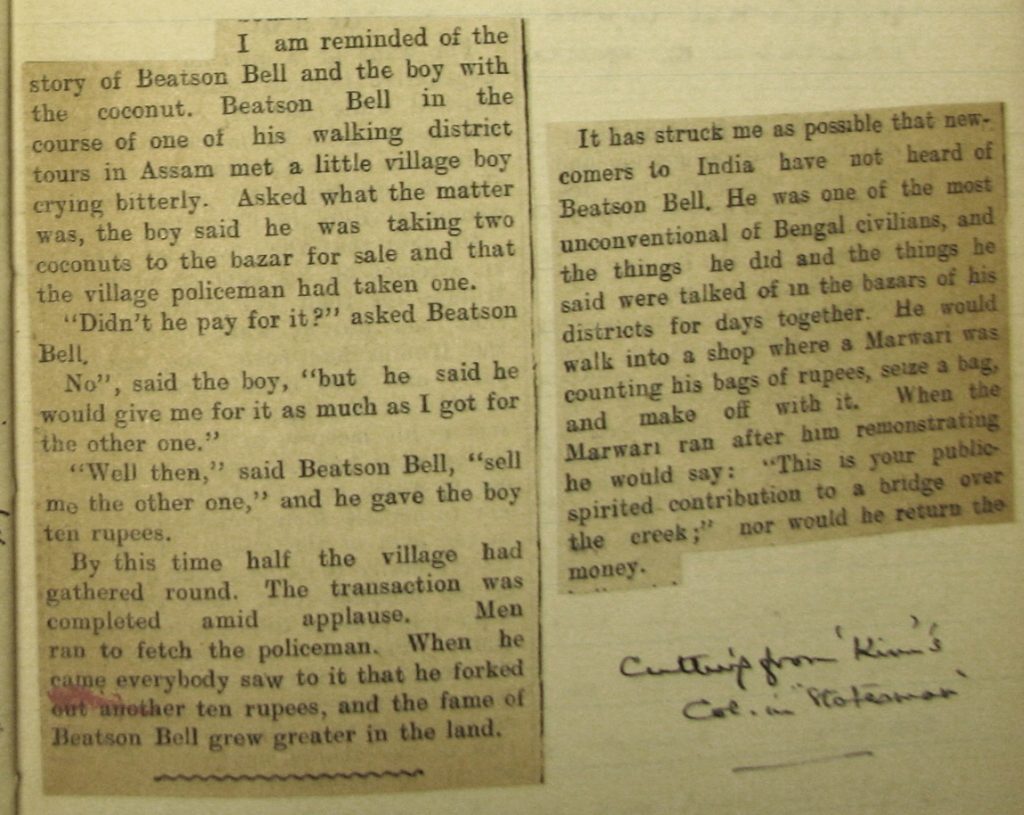
Cutting from ‘Kim’’s Col. in “Statesman”
Re Translation of Lushai N.T.
A. Willifer Young. B&F.B. Socy. Calcutta 18.8.25
“I take a most lively interest in this New Testament; it is far & away ‘ the best seller’, & the steady flow from the Bible House is a perpetual joy.”
1.10.25
“…the people in the North Lushai Hills seem to have an unlimited appetite for the New Testaments & I am just on the point of sending 600 copies to Dr Jones. Any day we may be called upon for an equal number from the Thado Kuki Pioneer Mission
“It is to me an inspiring & encouraging part of my work, & I think we all have cause for gratitude to you for so excellent a translation. Also for the fact that 10,000 New Testaments have been absorbed in the space of about three years.”
Lushais Value the N.T. An old friend of the Lushai mission Mr Pollard of 84 Clive Rd, Dulwich S.E. 21 has on more than one occasion given or sent to me money to purchase Lushai N.Ts with, for presentation to the poor. Originally he did this in memory of his only son who was killed in the war. Most of them who recd such gifts though me wrote short notes of thanks to Mr Pollard for his kindness & I had them translated by one of my boys & forwarded to him without any correction of the quaint English. The following is a typical one: —
Lungsen MV
28.4.25 recd
To Mr Pollard
My dear Grandfather in Lord Christ,
I received from Pu Buanga (J.H.L.) one of the New Testaments you gave for the poor & I thank you very much for it. Though the price of the Lushai New Testament is only a rupee it is as hard to have for the poor as if its fruits in the sky. I therefore thank you very much for giving me this book. My parents had left me no valuable things when they died. But I know that there is the most valuable thing to have in heaven which I have found in reading this book. May God bless me whenever I read it that I may understand the words in it. And may the Lord bless you for your kind deeds. I have found out that there is an eternal life by reading this book; knowing that I am filled with joy. This book is more valuable that all the treasures in the world.
The poor man whom you pity
Ngena
J.H.L.
Running to Extremes
“Emotional Instability” In a [sic] article on the book ‘Population Problems of the Pacific’ by Stephen H Roberts M.A. 21/- (pub. Geo Routledge & Sons, London) in the “Statesman” of June 26, 1927, the tendency of running to extremes so noticeable in the Lushai people is mentioned as being one of the traits of certain South Sea Islanders thus: – “some cure has to be found for the general lack of balance & insouciance (i.e. lack of care or forethought, heedlessness of consequences or of the future) in the native mind, & for its emotional instability… So great is this…..want of balance that any outside suggestion is greedily adopted & ridiculously exaggerated. As Sir Basil Thomson has described, the game of cricket when introduced became a national danger. Whole villages would form sides of anything up to two hundred apiece & play cricket for weeks from dawn to dusk while the plantations were neglected and crops were rotting on the ground.”
“No Place like Home”
A Lushai Pun When the Lushai labourmen in France were ask [sic] to volunteer to do six more months work there beyond their one year’s contract — which was then nearly completed — & were promised that if they would sign on for that added period they would be taken to see the great city (Khawpui) of London, they refused & said that they would much rather see their own family hen (arpui) than the great City (Khawpui). In saying this they not only showed the great longing which they had for Home, but their sense of humour — for they made a pun on the two Lushai words, which when pronounced rapidly sound very much alike.
Only British Grave in Lungleh 1927 In the middle of the grass covered shooting range at Lungleh is a solitary grave. One of the lads belonging to the Burma Column (see entry 26 May 1892) which came through Lushailand from Burma in 1892 when we lived at Kassalong. The inscription on the stone reads thus:
Rest in Peace
IN LOVING MEMORY OF
No 6117 Private Robert Randall
of the 4th Battalion KRR(?)S (?A)
15 May 1892
at Lungleh
MUCH REGRETTED BY HIS COMRADES
More Schoolboy Howlers (Exam Nov 1927)
Ques: Define “Circumference) & mention the names of any other parts of a circle which you know.
Ans “A.” Circumference is a figure which has no long and wide.
Ans “B” Circumference is a straight line bounded by a circle figure.
Ans “C.” Circumference is a circle of a diameter.
(L.P.) Chalthanga’s version of “Long Measure”
12 inches = 1 feet
3 foot = 1 yard
5 ½ yard = 1 pole
365 pole = 1 yard
366 “ = 1 leep yard
50 yard = 1 jubeli
60 “ = 1 daymon jubeli
100 “ = 1 canchare
A new axiom invented by a Lushai youth: —“Things which are all divided are any equal”
More “Schoolboy Howlers” Ques. Translate into English the following:
Ka chaw ka ei zo ta vek a, ani erawh chuan a ei zo lo va
Correct English
I have eaten all my food, but he has not (eaten) all (his)
Two Lushai attempts:
- I took up my food but he is not take up.
- I had at my foot, he have us eat foot.
Re Lushai “Psalms”
F.W.S. wrote on 1 June 1928: —
“I found waiting for me the copy of the Psalms you have so kindly sent me. It tells me what a tremendous lot of work you have had to bring it up to its present perfection. What immense patience you needed to arrange for the proper places of all the references. No wonder you became ill & had to go for a rest in Calcutta….I wish it all the success it deserves from the labour you have expended on it. No one else in the whole world could or would have done it so carefully and well.”
Re Lushai “Psalms”
F.W.S. wrote on 12 June 1928: —
I have read a good deal of the Lushai Psalms. The more I read it the more I like it. Whether consciously or unconsciously you have rendered the words into real poetry & have lighted upon most happy expressions in giving the Lushais the Psalmists meanings. I have said to myself there are 179 different languages & 544 dialects in India, but I doubt if there is in anyone of them such translations of the Scriptures as there is in Lushai. I don’t believe there is one now with references & notes as in Lushai. I should say the same if the translation had been done by anyone else. But it gives me more pleasure because it has been done by you. I have heard from many of the North Lushai people their opinion of books & translations made for them in the South & they praise them and greedily long for more.”
Revival Dangers In the West African ‘Qua Iboe’ Mission news dated June 1928 I find the following which reminds me forcibly of the problems we have to face in Lushailand in times of Revival, but I have learned to love such gracious visitations, for the blessing they bring with them far out-weigh the harm done by those who abuse them.
“The Revival Movement which brought such blessing to Uyo is in progress in the Ika District, & has also appeared at several Etinan & even out-stations. Amid much that is extravagant there appears to be deep conviction of sin and intense love for prayer & God’s word. The natives are very ignorant & liable to excitement, & the missionaries appeal for earnest prayer that God may guide them as to the right attitude in dealing with the difficult situation.”
“Wave of Indifference” In the same news sheet there is the following sentence which might be written of Lushailand upon occasion: —
“The work at Aba is suffering from a wave of indifference.”
Simultaneous Reading of the Lushai “Psalms.” Edwin Rowlands wrote from near Paletwa in Arakan on 21.5.28:
“Thank you and Pidari warmly for sending on the first issue of the Psalms. It is nicely printed. It is the result of great care, & no one knows except those who have tried as one has the effort it has cost — & especially to you, dear Lorrain, who is taking such pains to give the Lushais a worthy translation of the greatest treasure they have or ever will have. I sincerely rejoice with you in this issue of the Psalms, dear Lorrain…As I write this one of our people is sitting near reading the “Sâm Bu” (Psalms) just received & how much reading there will be all over the country of the Psalms! Perhaps there never has been such a reading of the Psalms – at once [note: “at once” is double underlined], in the history of the world as there will be when the consignments arrive.”
Perfection not Here [note: the following appears vertically in the original Logbook; it has here been rotated 90° clockwise]
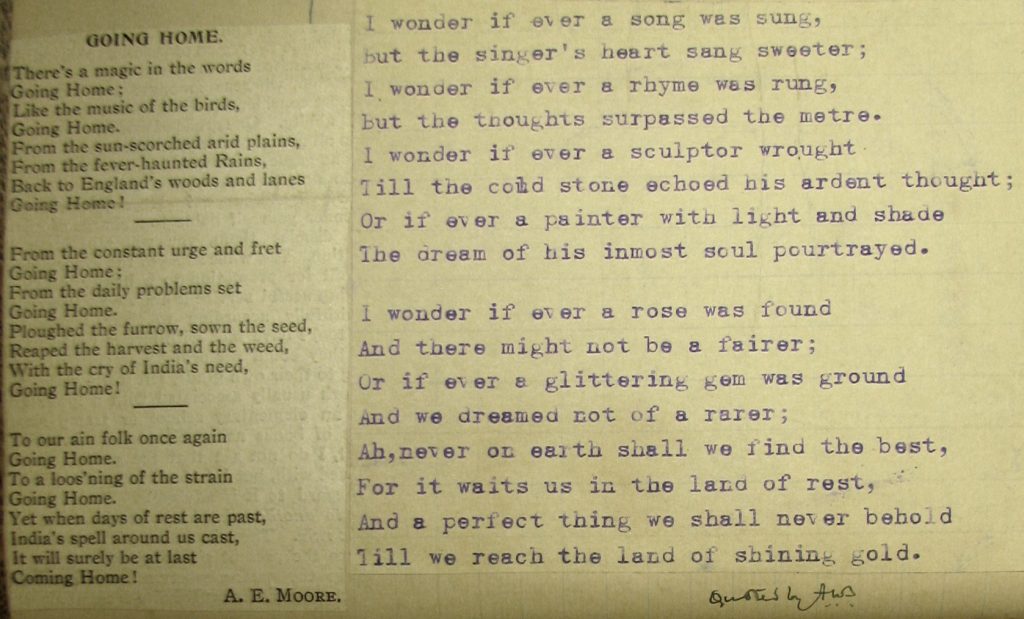
Then & Now 1889/ 1928
(Lt Col (then Capt) John Shakespear &) “Mr Murray went to Serkawn in the expedition of 1889 & were struck with the view of the country from that position. Shakespear suggested that they should camp on that beautiful spot for few days. Mr. Murray was against that as they had only 20 sepoys & they would certainly be cut to pieces by the Lushais the first night. So that was abandoned. What I call curious about it is, that Mr. Murray’s son Challiana is living now, it may be, on the same spot in perfect safety trying to save the lives of the people whom his father tried to kill & was afraid of”
(Extract from letter from F.W.S. re a letter he had had from Lt. Col John Shakespear 1928)
No Nitrogen in Ireland A student (not in Lushai) in an exam on chemistry was asked to say what he knew about Nitrogen & amongst other things he said “Nitrogen is not found in Ireland” This puzzled the examiner so much that he sent and asked the boy where he had obtained that information. “In the text book” he replied, & turned up the passage where it was written:
“Nitrogen is never found in a free state.”
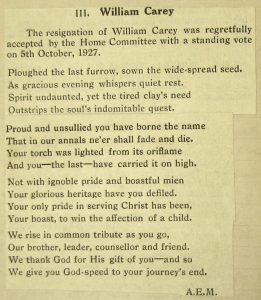
Going back to Labrador to get warm? Sir Wilfred Grenfell said the other day before he left London that the coldest places in the world are the bedrooms at night in this country (Great Britain). “ I am longing,” he said, “ to get back to Labrador to feel warm.” Letter from F.W.S dated 9.1.29)
From an Insurance Advert
May 1929
He slept beneath the moon
He basked beneath the sun,
He lived a life of going-to-do
And died with nothing done.
Our Christian Lushais turning Cannibals! 26.2.1929
Yesterday I had a letter from Hrangchhunga the Schoolmaster at Khawhri the following sentences:
“Lianchawa’s wife has eaten a baby girl & we all greatly rejoice with them over the event.”
This piece of news conveyed the impression that our good Christians out at Khawhri were turning cannibals & were rejoicing over it, but I decided eventually that it was only a slip of the writer’s pen which had made him write “ei” (= has eaten) for “nei” (=has given birth to). I sent him back his letter with the words marked & I expect he & his friends will have a good laugh over his blunder.
(“Lianchama nupui chuan fa nu a ei a”
The Great Rain June 1929
Letter from the Postmaster of Aijal to the Postmaster of Lungleh.
Re. Stoppage of Mails
“My Dear Khirode Babu,
Don’t be so very anxious for mail & Tele Connections. Let this bad June be away and then you are to expect restorations. Here also the same. Getting no mails nor despatching any. About whole Cachar & Sylhet, (though no definite information) it must be under high water throughout. The officers at Silchar Hd Quarter even unable to manage dak line up to Dwarband only 18 miles from Silchar — The mails despatched by me are all detained at Kolasib. No hope of any side whatever before July — so wait & wait.
Yours (snd.) N Banerji
Amusing English Essay of Japanese boy:—
Honorable Banana The banana are [sic, and for entire paragraph] great remarkable fruit. He are constructed in the same architectural style as the honorable sausage: Difference being, skin of sausage are habitually consumed, while it are not adviceable to eat rapping of banana. Perhaps are also intrissting the following differences between the two objects: Banana are held aloft while cosuming: Sausage usually left in reclining position. Banana are first green in culler, then gradual turn yellowish. Sausage startout with indefinit culler (resemble terrier cotta) & retain same hue indefinitely. Sausage depend for creation upon human being or stuffing machine while banana are pristine product of honorable mother nature. Both article resemble the other in that neither have pit or colonel of any kind. In case of sausage both conclusions are attached to other sausages: honorable banana on opposite hand are joined on one end to them: other termination are intirely loose: And finally banana are strickly member of vagitable kingdom, while affiliation of sausage is often undecided.
Baboo English
The Lungleh Postmaster is reply [sic] to an enquiry regarding the non-arrival of my brother’s mail runners says: —“Perhaps they are detained at Kolodyne which is suspected to be beyond cross for rise of water” — a rather neat way of saying he expected that the rise of water in the Kolodyne River had made it impossible for the men to cross.
A Serkâwn Tragedy of long ago Lalbuanga was the name of the chief living on the site of our present house at Serkawn when the place was occupied by a branch village or vêng of Seipuia whose vêng was on Ram Zotlang. A slave man of Lalbuanga had died & they fired off a gun just before he was buried. The bullet glanced off something and hit the daughter of Pasaia — a maiden of about 13 who was on her father’s house platform — and killed her instantly. Pasaia’s house was slightly to the east of where Fred’s house now stands.
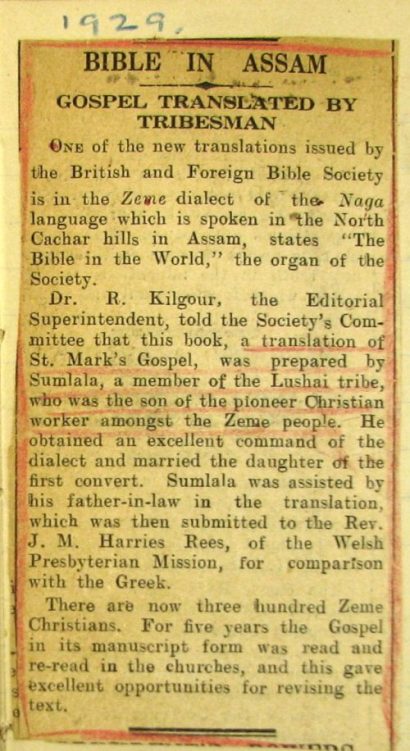
Setting the Demon’s teeth on Edge [underlined also in red-orange] In the Tipperah Hills the people think that convulsions are caused by an evil-spirit biting the child who is so affected, so they scrape pieces of bamboo or iron together in order to set its teeth on edge & cause it to let go.
Capt (now Col) John Shakespear’s kindness Zakhama tells of how when the fighting was going on in the olden days — when we lived at Kassalong — & the British took Chhipphir village Capt Shakespear found some poor cripples & old folk left behind by the retreating villagers. He had them placed on a house platform & guarded by a sentry so then none of the sepoys should molest them & also commanded that food should be given to them. Zakhama also tells how he & other boys would run to welcome Capt Shakespear & how he would crack his knuckles to amuse them, or bare his white arms for their pleasure.
Giants in the Lushai Hills There is said to be a cave at Chawng Tui containing a number of human bones. Some of the shin bones there are said to measure 4 ft. 4 inches in length without their heads (or bâwk) which disappeared on account of age.
A Salt Lick “In some parts of Tibet & Turkestan the rock salt is never broken into pieces & pounded to put into meals. It is kept as a REAL LICK. One purchase of a large stone (from India) is made every year. This is put up in a convenient place and the members of the family lick it after before or after meals. There being no tradition of hospitality in these places the salt is hidden when strangers are likely to arrive. They may obtain a grudging meal, but it will be without salt. If a traveller is shown the salt & permitted to lick it he may take it that he is being accepted as one of the family”
“Statesman” 75.5.30 From leading article
GREAT RAIN
Biggest rainfall on record in the Lushai Hills from June 1-12 1929. The places are arranges in order of merit. Lungleh having the largest. Aijal the smallest rainfall.
| 1929 | LUNGLEH | SERKAWN | SIALSUK | DEMAGIRI | SHERKOR | BARKAL | RANGAMATI | KODALA (CHANDRAGHONA) | AIJAL |
|---|---|---|---|---|---|---|---|---|---|
| 1 June | 1.22 | 1.60 | .07 | .30 | .05 | .00 | .13 | .20 | .61 |
| 2 “ | 2.00 | 1.53 | 1.37 | .26 | 2.30 | .54 | .80 | .84 | 1.80 |
| 3” | .08 | .02 | .07 | 1.86 | .20 | .58 | .84 | 2.40 | .00 |
| 4” | 1.24 | 1.21 | .30 | 8.13 | 1.55 | 1.00 | 2.00 | 6.30 | .13 |
| 5 “ | 9.32 | 9.19 | 6.33 | 11.20 | 7.30 | 9.15 | 6.12 | 5.55 | 3.46 |
| 6 “ | 5.48 | 5.87 | 4.72 | .55 | 3.70 | 10.40 | 5.20 | .57 | 2.32 |
| 7 “ | .44 | .33 | 1.30 | .88 | .35 | .13 | .50 | .97 | .00 |
| 8 “ | .85 | .78 | .92 | 1.80 | .75 | .70 | 1.50 | 1.57 | .00 |
| 9 “ | 3.20 | 3.34 | 2.83 | 7.33 | 2.40 | 1.17 | 1.68 | 3.87 | .72 |
| 10 “ | 9.83 | 9.83 | 14.36 | 3.01 | 6.35 | 4.68 | 5.26 | .58 | 6.74 |
| 11 “ | 16.70 | 14.33 | 6.16 | 6.15 | 7.50 | 4.19 | 6.18 | 2.22 | 5.32 |
| 12 “ | 12.32 | 12.44 | 7.24 | 2.06 | 5.85 | 4.68 | 6.0 | 1.30 | 1.07 |
| Total | 62.98 | 60.47 | 45.67 | 43.83 | 38.30 | 37.22 | 36.21 | 26.37 | 22.17 |
[Note: original table reproduced below. This table appears vertically in the original logbook but has here been rotated 90° clockwise for readability]
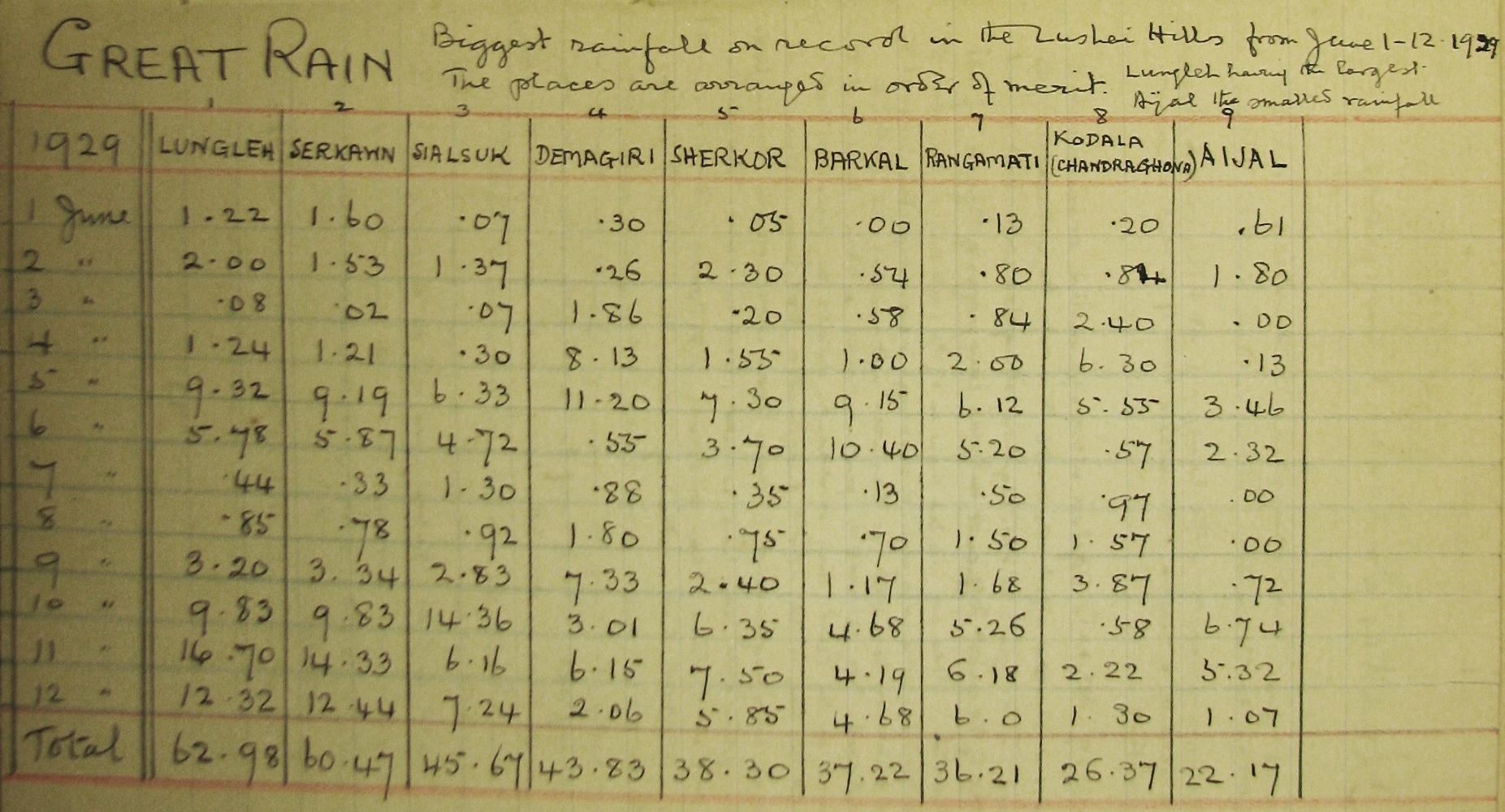
Postmaster
Post Office
etc.
which
an ethnic grouping of people who live mostly in Chin State, Myanmar
British & Foreign Bible Society
received

